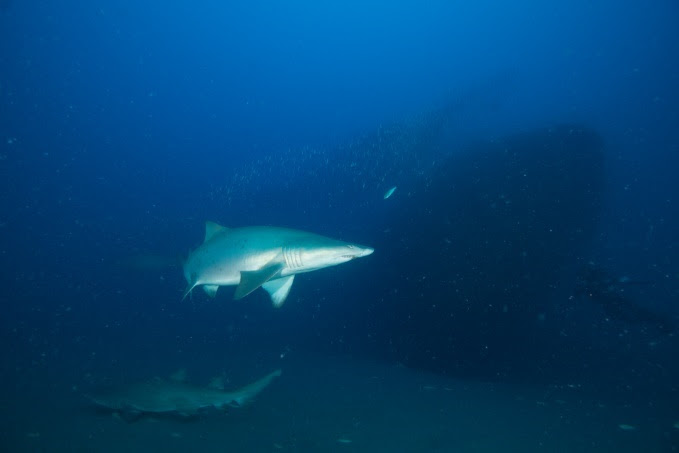NOAA’s National Centers for Coastal Ocean Science (NCCOS) and partners recently completed two research projects to better understand the relationship between artificial reefs and large predators, like sharks. The team’s findings reveal that predators may prefer artificial reefs, like shipwrecks, to natural habitat, and their presence can influence community structure found on shipwrecks.

In the first study, comparative field surveys of 30 artificial and natural reefs across the North Carolina coast revealed large reef-associated predators were more abundant on artificial than natural reefs. This pattern was associated with higher densities of transient predators (e.g., jacks, mackerel, barracuda, sharks) on artificial reefs, but not of resident predators (e.g., grouper, snapper). Further analyses revealed that this pattern of higher transient predator densities was greater on artificial reefs composed of ships than concrete reefs, and the taller the ship, the better.
The second study, completed using remotely operated vehicle (ROV) surveys of large sharks and reef fish on historic shipwrecks, found that the presence of large predators on artificial structures or reefs, can drive short-term changes in community structure. The researchers conducted ROV surveys of seven shipwrecks located on the continental shelf of North Carolina. The ROVs were outfitted with high-definition video cameras to study the types of fish living on the wrecks. Scientists found that while the total number of reef fish present (abundance) did not vary with shark presence, the number of different species present (species richness) differed based on proximity to the sharks. When sand tiger sharks were present on shipwrecks, scientists recorded a higher variety of reef fish closer to the sharks than farther away.
Community composition (types of species present) also differed based on presence or absence of sharks. Benthic-associated species, like sea bass and grouper, were more often seen on shipwrecks where sharks were not present, while water-column associated species, like barracuda and jacks, were more indicative of the presence of a shark.
Together, these findings provide evidence that artificial habitats, especially those like sunken ships that provide high vertical structure, may support large predators. These studies support previous research on the role of large predators in structuring communities, and provide evidence of short-term influences of a large predator on reef fish communities occupying artificial habitats. NCCOS research on the ecological function of artificial reefs supports NOAA’s mission of stewardship, and will help NOAA and partners ensure that these special shipwrecks remain valued and healthy coastal resources.
Research partners for both studies include the University of North Carolina at Chapel Hill – Institute of Marine Sciences, and Duke University. Partners for the second study also include the North Carolina Aquariums and South-East Zoo Alliance for Reproduction and Conservation.
